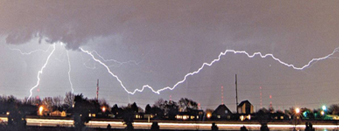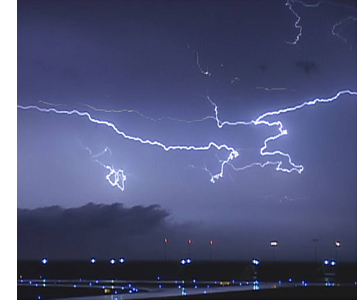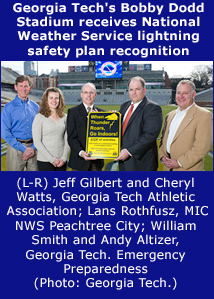|
The fact that reliable protection against lightning is possible and available places a responsibility to provide this protection on everyone involved with the design, construction and operation of recreational facilities. Liability lawsuits for failure to address lightning risks can extend beyond facility owners to include contractors, construction managers, architects and engineers, building inspectors and project consultants.
Providing lightning protection for recreational facilities with large open areas is difficult but not impossible. Designers can rely on the same design criteria that organizations like the FAA, NASA and the U.S. Department of Defense have developed to protect munitions, piers, air fields and camps. These design criteria are described in the National Fire Protection Association standard, NFPA 780 – Standard for the Installation of Lightning Protection Systems. (See below for details on NFPA 780)
Ideally the lightning protection provisions should be addressed during the design and construction phase of a facility. This allows for creative aesthetic choices for the placement of overhead shield wires and underground conductive grids to protect more open areas and for the placement of lightning protected shelters.
^Top
 Designers can turn to the Lightning Protection Institute, Underwriters Laboratories and the National Fire Protection Association for more information on effective lightning protection system design. Click on the links below to access information on industry-recognized lightning protection system installation requirements and inspection programs. Designers can turn to the Lightning Protection Institute, Underwriters Laboratories and the National Fire Protection Association for more information on effective lightning protection system design. Click on the links below to access information on industry-recognized lightning protection system installation requirements and inspection programs.
NFPA 780: STANDARD FOR THE INSTALLATION OF LIGHTNING PROTECTION SYSTEMS
The Lightning Protection Institute (LPI) Inspection Program
Underwriters Laboratory’s (UL’s) Lightning Protection Inspection Certificate Program
^Top
A number of authorities have studied the benefits of lightning protection. Among them:
 In January, 2003 the American Meteorologist Society issued a Bulletin endorsing the lightning protection requirements embodied in NFPA Standard 780. Stating, “It is now well established that properly installed and maintained lightning rod-based protection systems significantly decrease lightning damage.” In January, 2003 the American Meteorologist Society issued a Bulletin endorsing the lightning protection requirements embodied in NFPA Standard 780. Stating, “It is now well established that properly installed and maintained lightning rod-based protection systems significantly decrease lightning damage.”
Click here for American Meteorological Society Bulletin.
- In 2001 a joint paper was issued by lightning experts at the U.S. Army, Navy, Air Force, Nat’l Severe Storms Laboratory, Defense Explosives Safety Board, Dept of Energy, NASA and FAA. This paper underscores the critical role that lightning protection systems play in protecting our national infrastructure.
Click here for The Basis of Conventional Lightning Protection pdf.
- In 2005 the General Accounting Office (GAO) evaluated the Federal government’s protection of its facilities from lightning. In its report, the GAO required compliance with NFPA 780 for federal facilities determined to need lightning protection.
Click here for the GAO Report on Use of Lightning Protection.
- The U.S. Dept of Defense tracks lightning damage at explosives storage facilities, which number in the 1000’s world-wide. In the 82 years from 1918-2000 they report 59 incidents of lightning damage. Of these, 4 were to structures that were equipped with lightning protection.
- The FAA tracks lightning damage to its facilities, which are protected by lightning protection systems. FAA documents all lightning strikes within 20 nautical miles of Doppler radar installations. In July, 2000 alone they documented over 250,000 lightning strikes within a 20 nautical mile radius of their sites with just 3 lightning related radar malfunctions. In two Florida locations during this single month, 25,000 and 20,000 cloud-to-ground strikes were recorded with no equipment failures.
Note: References to reported failures may be due to improperly maintained lightning protection systems.
^Top
Woman shocked by lightning at SeaWorld Orlando
Lightning Strikes Connecticut Golf Course, Several Hurt
One dead, nine hurt after lightning strikes at Pocono Raceway, August 5, 2012
Adventure Island fined for employee lightning death, July 25, 2012
SeaWorld Lightning Strike Injures 8 People At Water Park In Orlando, Florida, August 2011
Coroner: Lightning likely a factor in golf course death, June 2011
Man Killed By Lightning Bolt On Baseball Field, June 2011
Youth Soccer Coach Dies On Soccer Field, Sept. 2010
Montana man Killed by Holiday Lightning Strike in Castle Rock Park, July 2009
^Top

|
QUICK NAV
The Importance of Planning for Lightning Safety
U.S. Lightning
Protection Standards
What the Experts Say
Lightning Deaths and
Serious Injuries
Large Venue
Lightning Safety
Tool Kit
NOAA offers a voluntary recognition program to help large outdoor venues better protect staff and patrons from the dangers of lightning. Click here to learn more.

|
Buyer Beware
The need to comply with the U.S. Safety Standards for lightning protection maintained by NFPA, UL and the LPI cannot be overstated. There are products on the market that claim to offer a quick fix to protecting open spaces from lightning damage. These products do not meet U.S. Safety Standards and have been the subject of a great deal of criticism by independent lightning experts. One recreational facility employed such a system with apparently catastrophic results according to a report issued in April 2012.
|
|

 Owners and operators of outdoor recreational facilities rely on engineers and architects to incorporate state-of-the-art lightning protection technologies to ensure the safety of patrons and employees at theme parks, water parks, stadiums and other outdoor venues. Given the volume of patrons and the open spaces at recreation facilities, it can be difficult to effectively provide protection from lightning. However, numerous facilities have developed comprehensive lightning protection strategies that include detection, warning, evacuation and physical protection of facilities.
Owners and operators of outdoor recreational facilities rely on engineers and architects to incorporate state-of-the-art lightning protection technologies to ensure the safety of patrons and employees at theme parks, water parks, stadiums and other outdoor venues. Given the volume of patrons and the open spaces at recreation facilities, it can be difficult to effectively provide protection from lightning. However, numerous facilities have developed comprehensive lightning protection strategies that include detection, warning, evacuation and physical protection of facilities.  Designers can turn to the Lightning Protection Institute, Underwriters Laboratories and the National Fire Protection Association for more information on effective lightning protection system design. Click on the links below to access information on industry-recognized lightning protection system installation requirements and inspection programs.
Designers can turn to the Lightning Protection Institute, Underwriters Laboratories and the National Fire Protection Association for more information on effective lightning protection system design. Click on the links below to access information on industry-recognized lightning protection system installation requirements and inspection programs. In January, 2003 the American Meteorologist Society issued a Bulletin endorsing the lightning protection requirements embodied in NFPA Standard 780. Stating, “It is now well established that properly installed and maintained lightning rod-based protection systems significantly decrease lightning damage.”
In January, 2003 the American Meteorologist Society issued a Bulletin endorsing the lightning protection requirements embodied in NFPA Standard 780. Stating, “It is now well established that properly installed and maintained lightning rod-based protection systems significantly decrease lightning damage.”